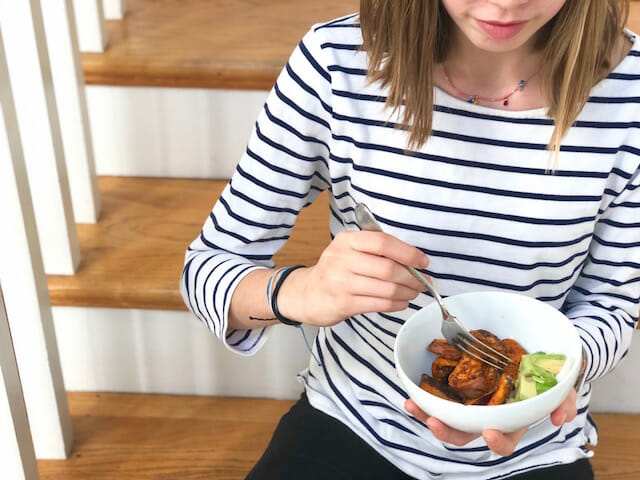Back when my cousin Heather announced at age 13 that she was going to be a vegetarian, you’d have thought she was running off to join a religious cult. In our family of enthusiastic omnivores, it was borderline scandalous. These days, however, it’s much more commonplace for kids to go vegetarian. My oldest daughter went meat-free when she was a junior in high school, and now my youngest, a high school freshman, has joined the vegetarian tribe.
Part of me breathes a deep, exhausted sigh over this, not wanting my children’s dietary preferences to rule my kitchen. I’ve stood firm on my “we all eat the same dinner” policy since they were tiny, after all. At the same time, I respect their wishes and honor their passion for animal welfare and the environment. I also believe that a plant-forward diet is an excellent one, not just for our bodies, but for the planet.
The reality is, having a vegetarian in the house and keeping that child in good food affects everyone. If you have a child interested in going vegetarian, below are a handful of pointers that may ease the transition.
1. Start with a Conversation
Sit down and have a heart to heart with your child about his motivations for being vegetarian. Find out, specifically, what foods he plans to eliminate. Is it just red meat or the entire animal kingdom? If the latter, see if there’s wiggle room for negotiation. When one of my girls talked about eliminating eggs, I pointed out how eggs provide key nutrients that are hard to get in a meatless diet. She agreed to keep them in her repertoire.
2. Be Aware
I always have my antennae up when a child, and particularly a teenager, wants to make dramatic dietary changes. Sometimes eliminating foods is code for dieting, not genuine, healthy lifestyle changes. There’s also a lot of “jumping on the bandwagon” that goes on in the pre-teen and teen years, so try to tease out if your child’s desire to be vegetarian is authentic. When my younger daughter was in middle school, it seemed nearly every girl in the grade was experimenting with some type of diet — vegan, vegetarian, paleo, and so on. She held off going vegetarian until it was clear that her motivations were coming from within, not from peer pressure.
3. Have a trial period
There’s no harm in inviting your child to give vegetarian eating a try for a week or two. A trial period will give him a sense of what he is in for and if its something he wants to stick with for the long haul. You don’t want your child to feel locked in to being a vegetarian once he begins.
4. Educate them
Teach your child that eliminating certain foods can impact her nutritional intake. Emphasize the positives of a plant-based diet, but also the fact it means being extra vigilant to cover all her nutrient needs. Let her know that there is a whole spectrum of vegetarianism and it is not a one-size-fits-all diet. Case in point: I have a friend who goes meatless most of the time, but occasionally indulges her passion for cheeseburgers. That’s okay, too.
5. Share the responsibility
Arm your child with tools to feed himself well, including a pantry of vegetarian-friendly ingredients and an assortment of appealing recipes. Pick up a vegetarian cookbook or two at your local library or bookstore or peruse the vegetarian recipes on this blog. Have your child start by choosing a few dishes that look interesting and carve out some time to cook them together.
6. Be supportive
If ultimately being a vegetarian is something about which your child feel strongly, do your best to be respectful. At the same time, let them know if ever they want to opt out of vegetarian eating, that’s okay too. No judgements.
